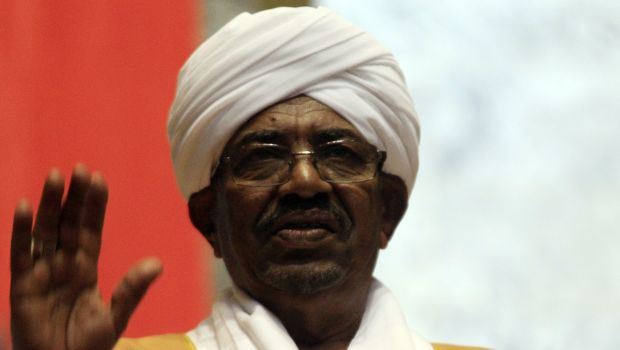
Sudan’s President Omar Al-Bashir gestures as he gives an address at the opening of the eighth session of Parliament in Khartoum on October 28, 2013. (REUTERS/Mohamed Nureldin Abdallah)
Khartoum, Asharq Al-Awsat—Sudanese political opposition forces have denied they were set to participate in meetings with President Omar Al-Bashir starting on Sunday, and have refused to participate in any talks until their preconditions are met.
Members of the opposition Communist, Nasserist and Ba’ath parties said they had not agreed to take part in any dialogue with the government after the National Congress Party’s political affairs secretary, Mustafa Osman Ismail, announced that Bashir would be holding meetings with Nasserist and Ba’ath party leaders.
In a speech on January 27, Bashir invited political parties to take part in a dialogue based on four main points: peace, building a free political society, eliminating poverty and reviving Sudan’s national identity. But the alliance of opposition parties said they would not participate without a number of preconditions being met, including steps to rebuild confidence in the government, the repeal of laws restricting liberties, an end to the military conflicts in the country, and the formation of a transitional government that would hold a constitution-drafting conference and prepare for fair elections.
The Umma Party, led by Sadiq Al-Mahdi, and the People’s Congress Party, led by Dr. Hassan Al-Turabi—the two largest parties in the opposition—did agree unconditionally to participate in the dialogue with the ruling party.
Ismail denied any knowledge of a planned meeting between Bashir and leaders of the Communist Party, which had been announced earlier by Cabinet Minister Ahmad Sa’ad Omar. The Communist Party called the announcement “unfounded.”
A member of the Central Committee of the Communist Party, Suleiman Hamed, said in a statement that his party did not agree to the meeting and had only heard about it in the press, and that it would not agree to a dialogue unless the ruling party agreed to its conditions, which would “prepare the suitable climate” for such dialogue.
The Socialist Arab Ba’ath Party also confirmed it would not meet Bashir unless he agreed to the confidence-building conditions set out by the opposition. Spokesman Mohammad Diyaeddin told Asharq Al-Awsat he did not receive an invitation to meet the president, but that even if he did, he would only meet Bashir if his party’s conditions were met.
The political secretary of the Ba’ath Party, Kamal Hamed Boulad, described the conditions as “compulsory” and said his party would not participate in the talks.
The Ba’ath Party’s leader, Mohammed Ali Jadin, also denied receiving an invitation to meet the president.
He added in a press interview that his party was committed to the demands made by the opposition alliance, saying his party would not participate in the dialogue on its own, but only within the alliance of the opposition forces.
Jadin said his party received an invitation to hold talks with the ruling party and that it had replied to the invitation in writing—but added that he did not receive an invitation to meet the president or receive any reply.
Meanwhile, the Nasserist Party said its political bureau had not yet met to decide on its participation in the dialogue. A leading figure in the party, Satia Ahmad Al-Haj, told a local newspaper his party was committed to the opposition alliance’s conditions.
The Reform Now Movement, which split from the ruling party and is led by Islamist Ghazi Al-Atabani, described the dialogue as “selective bilateral meetings” with some parties.
In a statement, Atabani said Bashir’s comments in Port Sudan last week and his insistence that the national salvation government would stay “in spite of everyone” were the last nails in the coffin of the National Dialogue Initiative, and that they destroyed any belief that the president had risen above party politics.
Atabani’s statement ridiculed the political opposition forces; “They wait for scraps to be thrown by the president or the National Congress Party” at a time when the people are enthusiastic for the dialogue and reform, while the “opposition acts as spectators,” he said.
Atabani called on the political forces to free themselves from “the negative, pathetic state” in which they have put themselves, and to free themselves from the grip of the ruling National Congress Party and the president, to meet a minimum level of requirements for the National Dialogue Agenda, and participate in it even if the ruling party were absent.
